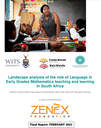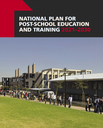
New Publication NSI 08 : The Education-Training-Work Continuums: Pathways to Socio-Professional Inclusion for Youth and Adults

New Publication NSI 08 : The Education-Training-Work Continuums: Pathways to Socio-Professional Inclusion for Youth and Adults

y Anthony A Essien (Wits), Ingrid Sapire (Funda Wande, Wits), Nick Taylor (JET Education Services)

Digital transformation is a complex process that with varying impacts across economic sectors. In the education and training sector, digital transformation in TVET can involve TVET operational systems (administration, finance, human resources, building infrastructure and maintenance, student registration, etc.); classroom delivery (learning management, instructional delivery methods, etc.); and the actual knowledge and skill component of the curriculum, for example by integrating productivity software such as word processors or spreadsheets into students’ learning outcomes. The integration of digital skills in the TVET curriculum allows learners to acquire the changing skills and knowledge (tacit and explicit) required to function in a digitalizing society, economy and labour market. Digital transformation in TVET is also transforming the dominant modalities of traditional face-to-face learning and teaching to involve multiple configurations of actors (learners, teachers and technologies/apps) in space and time (when, where, who, how). This means that digital transformation in TVET offers opportunities for teachers to reconsider their pedagogical assumptions, behaviours and relationships with students.
For over three decades, JET has worked with government and the public sector, civil society organisations, local and international development agencies and educational institutions to improve the quality of education and the overall relationship between education, skills development and the world of work.

To celebrate JET’s 30th year, two of JET’s former CEOs, Nick Taylor and Godwin Khosa, and the current CEO, James Keevy, in a conversation facilitated by Professor Peliwe Lolwana, watch the conversation...


We're pleased to share the JET Annual Report this Nelson Mandela Day

This report is the first rigorous global analysis of TVET challenges and reforms in developing economies and has been launched by the World Bank, the ILO, and UNESCO. JET is proud to have made a contribution to this important study.

The National Plan for Post-School Education and Training (NPPSET) 2021–2030 has been released. The NPPSET sets out a roadmap for implementing the policy vision of the White Paper for Post-School education and Training. The NPPSET sets out key system goals, objectives, outcomes and strategies aimed at achieving an integrated, coordinated, expanded, responsive, cooperative, quality, efficient, successful and articulated post-school education and training (PSET) system over the period 2021/2022 to 2029/2030.

The National Plan For Post-School Education And Training (NPPSET) 2021–2030 sets out a roadmap for implementing the White Paper for Post-School Education and Training.

A PSET CLOUD publication, authored by: Rooksana Rajab and Simphiwe Ntuli

JET Education Services annually facilitates an internship programme with the University of Pennsylvania, USA

JET Education Services (JET), a non-profit organisation (NPO) that works in education development, seeks to appoint two dynamic and accomplished Data Analysts for the Anglo-American South Africa (AASA) Education Programme.

A PSET CLOUD publication, authored by: Rooksana Rajab and Simphiwe Ntuli
![[VIDEO] Nick Taylor celebrates 30 years at JET [VIDEO] Nick Taylor celebrates 30 years at JET](https://admin.jet.org.za/news/news/video-nick-taylor-celebrates-30-years-at-jet/@@images/ef36f683-9e92-4cbe-ada7-ec2eb94846ce.png)
In conversation with Nick Taylor, Senior Research Associate, celebrating his 30th Anniversary at JET. Interviewed by: Zahraa McDonald, JET Specialist Manager: Research
![[VIDEO] Kathy Tracey celebrates 30 years at JET [VIDEO] Kathy Tracey celebrates 30 years at JET](https://admin.jet.org.za/news/news/video-kathy-tracey-celebrates-30-years-at-jet/@@images/d83f3587-03cb-4e69-9270-ba0343a029fb.png)
In conversation with Kathy Tracey, Strategic Support Manager, celebrating her 30 years at JET Anniversary. Interviewed by Thato Meje, Human Resources Administrator.

This Women’s Month, we honour and remember the women who have paved the way for future generations. We acknowledge their courage, determination, and commitment to creating a more equitable society. We believe that every girl and woman deserves access to quality education.

This report forms part of the consultancy Comparative skills profiling surveys and assessment of skills recognition opportunities facilitating refugees and asylum seekers’ access to the labour market in South Africa and Zambia. JET Education Services was commissioned by the ILO and the UNHCR to undertake this consultancy, which forms part of the Southern Africa Migration Management (SAMM) project. The SAMM Project is funded by the EU and implemented by the ILO, the IOM, the UNODC and the UNHCR. Its overall objective is to improve migration management in the Southern Africa and Indian Ocean region and to contribute to achieving the 2030 Development Agenda1

"By the end of 2020, Southern Africa hosted more than one million refugees and asylum-seekers."

The Annual Research on Socioeconomic Policy (RESEP) conference takes place on the 5th of September 2023.

UNESCO’s first Digital Learning Week takes place from 4 to 7 September 2023 at UNESCO Headquarters in Paris, France

The two days Department of Education (DBE) National Consultative Conference on Curriculum Strengthening is taking place 9-10 September 2023 at the Birchwood Conference Centre.

The UKFIET Conference 2023 - Education For Social And Environmental Justice: Diversity, Sustainability, Responsibility Examination Schools, takes place 12 – 14 September in Oxford, UK.

JET Education Services has partnered with the Sanlam Foundation on the Sanlam Foundation Education Programme

In 2023, World Teachers' Day celebrations will focus on the theme "The teachers we need for the education we want: The global imperative to reverse the teacher shortage".

Request for Proposals (RFP): Anglo American South Africa’s (AASA) Phase 2 Secondary School (Grades 8-12) Mathematics and Natural & Physical Sciences Curriculum Component Interventions

The Grade R Maths and Language Improvement Programme Learning Exchange live took place on the 7th of November 2023. It was an opportunity for individuals, groups, and organisations as well as all other stakeholders with an interest in early literacy and numeracy learning foundations, to learn by exchanging ideas and sharing common solutions to the challenges faced by Grade R teachers in the classrooms.

An interview with Azwindini Masia, the Business Manager for the AASA Education Programme at De Beers

The 5th JET Exchanges shares information about the Grade R Mathematics and Language Improvement Programme (MLIP) in which JET is a partner, describing the context in which the programme is being implemented before providing details on the programme itself. Foundational mathematics and literacy skills are premier issues in South African classrooms, both for learners as well as educators. South Africa has invested in several reading and mathematics interventions in the past years; however, setbacks like the COVID-19 pandemic rolled back progress that had been made. According to a background report by Spaull for the 2030 Reading Panel, If learning loss estimates are correct and SA does manage to get back onto the prepandemic improvement trajectory, it will still take 86 years from 2023 up to 2108 until all Grade 4 children can read for meaning in SA (Spaull, 2023, 8). Currently, 65% of learners lack the skills needed to progress in language and mathematics (Gauteng Education Development Trust, 2021, 7). Considering the challenging landscape for advancing effective mathematics and literacy interventions, the Grade R MLIP has led efforts toward improving outcomes in these areas for all schools in Gauteng Province offering Grade R from 2022 through 2024.

The NASCEE Annual General Meeting took place on the 08th of November 2023.

We are pleased and proud to announce that JET has been re-awarded Silver accreditation status in our recent IiP assessment

An Interview with Sarah Maseko, Administrative Coordinator at JET Education Services

From an internship to managing 16 projects, Thamsanqa (Thami) Zwane, Assistant Project Accountant, tells us about his journey at JET Education Services.

End of Year Message, closing off 2023
Read Towards a JET Theory of Change to learn how JET aims to affect others through evidence-based knowledge interventions, collaboration with the public and private sectors and the use of technological infrastructure to turn challenges into solutions, resulting in improved education quality, particularly for disadvantaged communities.

It is with great sadness that JET Education Services learnt of the passing of Professor Peliwe Lolwana.

We recently had the opportunity to learn a bit more about Nkhensani Baloyi in our discussion about her experience at JET. Serving at JET since 2021, Nkhensani has taken her own unique path toward her current position as an Early Childhood Development (ECD) Research Officer.
JET Education Services is pleased to announce the appointment of Dr. Thandi Lewin, Mr. Edison Mazibuko, and Mr. Zeyn Angamia to its board of directors.

The research paper “Using co-creation to address monitoring and evaluation challenges: The experience of South Africa’s evaluation hackathon” has been published in the Sage Journal, authored by: Eleanor Hazell, Ian Goldman, Babette Rabie, Jen Norins, Takunda Chirau, and Taruna Gupta.

In 2021, the South African Monitoring and Evaluation Association facilitated an evaluation hackathon that engaged diverse stakeholders in co-creation processes to develop practical solutions to address complex problems facing the monitoring and evaluation sector. The event catalysed broad-based ownership and enabled the South African Monitoring and Evaluation Association to coordinate the creative energy, commitment and resources of its members, government and other partners to achieve outcomes that would not be possible to achieve otherwise. The article analyses the co-creation approach adopted for the hackathon across four phases, namely initiation, process design/planning, co-design and development and application/follow-up. A retrospective analysis of the process and results identified eight key elements that enabled or impeded the successful completion of hackathon outputs and their conversion into useful products. These elements are facilitative leadership, purposive stakeholder selection, a well-delimited task, preparation, process facilitation, a valued product, voluntary contributions and further capacity. The lessons learnt provide useful insight for future efforts to generate localised, contextualised responses to evaluation problems.